Betty Bird (1901-1998) was a beautiful Austrian actress who appeared in several German films between 1927 and 1935.
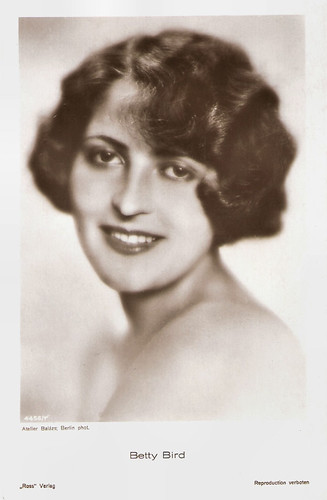
German postcard by Ross Verlag, no. 4456/1, 1929-1930. Photo: Atelier Balázs, Berlin.
Betty Bird was born in 1901 in Vienna, Austria-Hungary (now Austria) as Hilde Elisabeth Ptack. She was the daughter of Ludwig Ptack, the private secretary of Count Alexander Kolowrat-Krakowsky, the owner of the Sascha Film Factory. Thus Betty came into contact with film people at an early age.
In 1923, she married the cameraman and later film director Gustav Ucicky. In 1927 she became the ‘Viennese Film Beauty Queen’ and received a first film offer and debuted in Madame wagt einen Seitensprung/Madame makes an infidelity (Hans Otto, 1927), starring Xenia Desni. She now called herself Betty Bird.
With her husband she moved to Munich and later to Berlin. She made Der Ladenprinz/The Shop Prince (Erich Schönfelder, 1928), in which she played the cousin of Harry Halm.
Then followed a leading role in the German-Spanish silent film Herzen ohne Ziel/Corazones sin rumbo/Restless Hearts (Benito Perojo, Gustav Ucicky, 1928) in which she starred with Hanna Ralph and Livio Pavanelli.
The film was a co-production between the Spanish company Julio César and the German studio Bavaria Film. The Argentine actress Imperio Argentina was cast after winning a competition staged by the film's producers. On its release the film was attacked by Spanish critics who felt that the Spanish actors had been relegated to lesser roles.
She then appeared in the German production Der Herzensphotograph/The Heart Photographer (Max Reichmann, 1928) co-starring with Harry Liedtke, Robert Garrison and La Jana.
In the silent crime film Das grüne Monokel/The Green Monocle (Rudolf Meinert, 1929), she starred with Ralph Cancy and Suzy Vernon. It features Stuart Webbs, one of several German fictional detectives inspired by Sherlock Holmes, who had appeared in a series of silent German films during the 1910s and 1920s. Die Mitternachtstaxe/Taxi at Midnight (Harry Piel, 1929) is another German silent thriller in which she appeared opposite Harry Piel.
In Austria, she starred in the silent comedy Madame im Strandbad/Lady in the Spa (Edmund Hahn, 1929) about a small spa town, which tries to give the impression that it is actually a much more important place than it really is. Back in Germany she starred in the comedy Die vierte von rechts/The Fourth from the Right (Conrad Wiene, 1929) with Ossi Oswalda and Adolphe Engers.
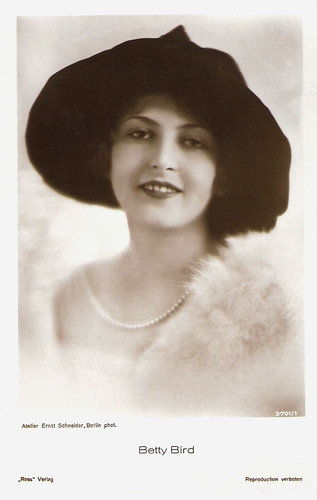
German postcard by Ross Verlag, no. 3701/1, 1928-1929. Photo: Ernst Schneider, Berlin.
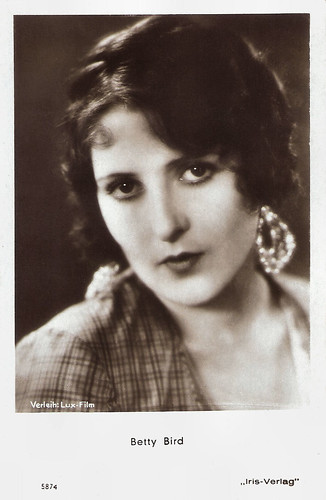
Austrian postcard by Iris-Verlag, no. 5874. Photo: Lux-Film.
Betty Bird smoothly moved into the sound era. She had a supporting part in the musical drama Liebling der Götter/Darling of the Gods (Hanns Schwarz, 1930) starring Emil Jannings, Renate Müller and Olga Tschechova.
Then followed a female lead opposite Hans Brausewetter and Willi Forst in the musical Ein Burschenlied aus Heidelberg/A Student's Song of Heidelberg (Karl Hartl, 1930) in the tradition of the nostalgic Old Heidelberg.
In the German drama Grock (Carl Boese, 1931), she co-starred with the famous Swiss circus clown Grock (as himself) and Liane Haid. She then starred in the farce Die spanische Fliege/The Spanish Fly (Georg Jacoby, 1931) with Lizzi Waldmüller and Fritz Schulz.
She had a supporting role in Opernredoute/The Opera Ball (Max Neufeld, 1931) starring Iván Petrovich, Liane Haid and Georg Alexander. It is an adaptation of the operetta Der Opernball and part of the many operetta films made during the decade.
In the following years she mainly played supporting parts, such as in the operetta Kaiserwalzer/The Emperor's Waltz (Friedrich Zelnik (Frederic Zelnik), 1933) starring Márta Eggerth, Paul Hörbiger and Willy Eichberger a.k.a. Carl Esmond.
Her final film was the Czech-German comedy Held einer Nacht/Hero of one Night (Martin Frič, 1935) with Vlasta Burian and Theo Lingen. In 1936, her marriage with Gustav Ucicky ended in a divorce.
In 1937, Bird married the Czech dentist Hruska in Rome. She retired from the film industry and lived in Italy till her death. Betty Bird passed away in Rome in 1998. She was 96.
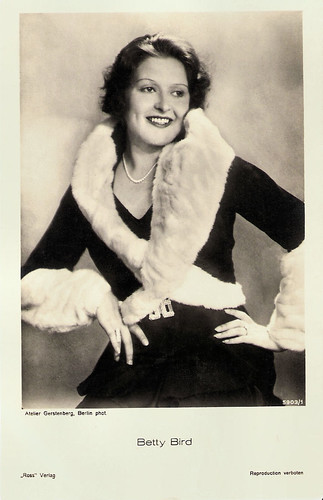
German postcard by Ross Verlag, no. 5903/1, 1930-1931. Photo: Atelier Gerstenberg, Berlin.
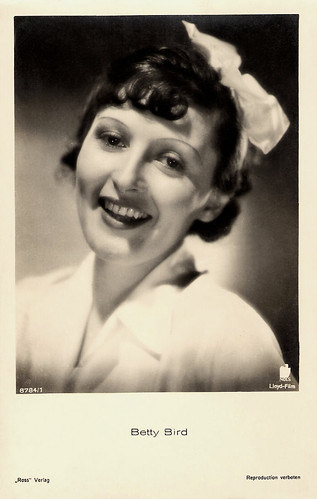
German postcard by Ross Verlag, no. 8784/1, 1933-1934. Photo: Lloyd-Film / Neue Deutsch Lichtspiel-Syndikat. Publicity still for Was bin ich ohne Dich/What Am I Without You (Arthur Maria Rabenalt, 1934).
Sources: Thomas Staedeli (Cyranos), Wikipedia (German and English), and IMDb.

German postcard by Ross Verlag, no. 4456/1, 1929-1930. Photo: Atelier Balázs, Berlin.
The Viennese Film Beauty Queen
Betty Bird was born in 1901 in Vienna, Austria-Hungary (now Austria) as Hilde Elisabeth Ptack. She was the daughter of Ludwig Ptack, the private secretary of Count Alexander Kolowrat-Krakowsky, the owner of the Sascha Film Factory. Thus Betty came into contact with film people at an early age.
In 1923, she married the cameraman and later film director Gustav Ucicky. In 1927 she became the ‘Viennese Film Beauty Queen’ and received a first film offer and debuted in Madame wagt einen Seitensprung/Madame makes an infidelity (Hans Otto, 1927), starring Xenia Desni. She now called herself Betty Bird.
With her husband she moved to Munich and later to Berlin. She made Der Ladenprinz/The Shop Prince (Erich Schönfelder, 1928), in which she played the cousin of Harry Halm.
Then followed a leading role in the German-Spanish silent film Herzen ohne Ziel/Corazones sin rumbo/Restless Hearts (Benito Perojo, Gustav Ucicky, 1928) in which she starred with Hanna Ralph and Livio Pavanelli.
The film was a co-production between the Spanish company Julio César and the German studio Bavaria Film. The Argentine actress Imperio Argentina was cast after winning a competition staged by the film's producers. On its release the film was attacked by Spanish critics who felt that the Spanish actors had been relegated to lesser roles.
She then appeared in the German production Der Herzensphotograph/The Heart Photographer (Max Reichmann, 1928) co-starring with Harry Liedtke, Robert Garrison and La Jana.
In the silent crime film Das grüne Monokel/The Green Monocle (Rudolf Meinert, 1929), she starred with Ralph Cancy and Suzy Vernon. It features Stuart Webbs, one of several German fictional detectives inspired by Sherlock Holmes, who had appeared in a series of silent German films during the 1910s and 1920s. Die Mitternachtstaxe/Taxi at Midnight (Harry Piel, 1929) is another German silent thriller in which she appeared opposite Harry Piel.
In Austria, she starred in the silent comedy Madame im Strandbad/Lady in the Spa (Edmund Hahn, 1929) about a small spa town, which tries to give the impression that it is actually a much more important place than it really is. Back in Germany she starred in the comedy Die vierte von rechts/The Fourth from the Right (Conrad Wiene, 1929) with Ossi Oswalda and Adolphe Engers.

German postcard by Ross Verlag, no. 3701/1, 1928-1929. Photo: Ernst Schneider, Berlin.

Austrian postcard by Iris-Verlag, no. 5874. Photo: Lux-Film.
An operetta wave
Betty Bird smoothly moved into the sound era. She had a supporting part in the musical drama Liebling der Götter/Darling of the Gods (Hanns Schwarz, 1930) starring Emil Jannings, Renate Müller and Olga Tschechova.
Then followed a female lead opposite Hans Brausewetter and Willi Forst in the musical Ein Burschenlied aus Heidelberg/A Student's Song of Heidelberg (Karl Hartl, 1930) in the tradition of the nostalgic Old Heidelberg.
In the German drama Grock (Carl Boese, 1931), she co-starred with the famous Swiss circus clown Grock (as himself) and Liane Haid. She then starred in the farce Die spanische Fliege/The Spanish Fly (Georg Jacoby, 1931) with Lizzi Waldmüller and Fritz Schulz.
She had a supporting role in Opernredoute/The Opera Ball (Max Neufeld, 1931) starring Iván Petrovich, Liane Haid and Georg Alexander. It is an adaptation of the operetta Der Opernball and part of the many operetta films made during the decade.
In the following years she mainly played supporting parts, such as in the operetta Kaiserwalzer/The Emperor's Waltz (Friedrich Zelnik (Frederic Zelnik), 1933) starring Márta Eggerth, Paul Hörbiger and Willy Eichberger a.k.a. Carl Esmond.
Her final film was the Czech-German comedy Held einer Nacht/Hero of one Night (Martin Frič, 1935) with Vlasta Burian and Theo Lingen. In 1936, her marriage with Gustav Ucicky ended in a divorce.
In 1937, Bird married the Czech dentist Hruska in Rome. She retired from the film industry and lived in Italy till her death. Betty Bird passed away in Rome in 1998. She was 96.

German postcard by Ross Verlag, no. 5903/1, 1930-1931. Photo: Atelier Gerstenberg, Berlin.

German postcard by Ross Verlag, no. 8784/1, 1933-1934. Photo: Lloyd-Film / Neue Deutsch Lichtspiel-Syndikat. Publicity still for Was bin ich ohne Dich/What Am I Without You (Arthur Maria Rabenalt, 1934).
Sources: Thomas Staedeli (Cyranos), Wikipedia (German and English), and IMDb.
Interesting she could be a long lost relative of mine. Paul Ptack
ReplyDelete